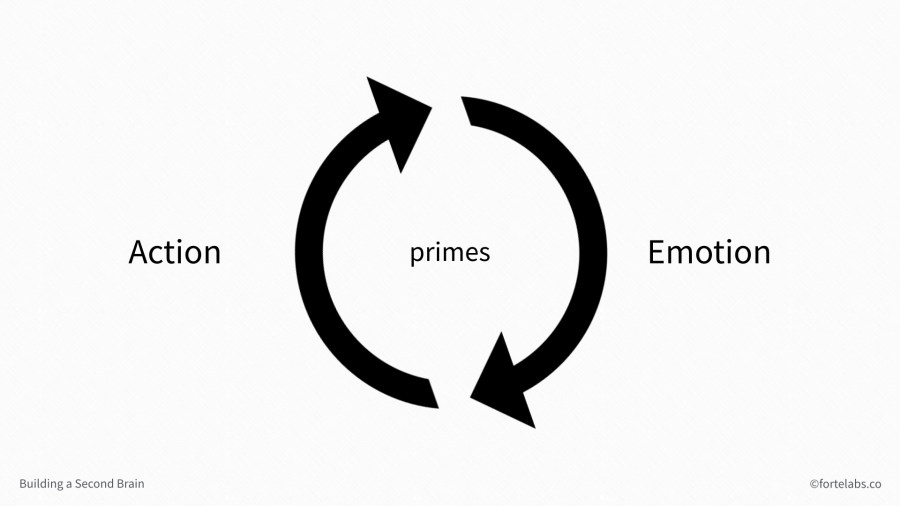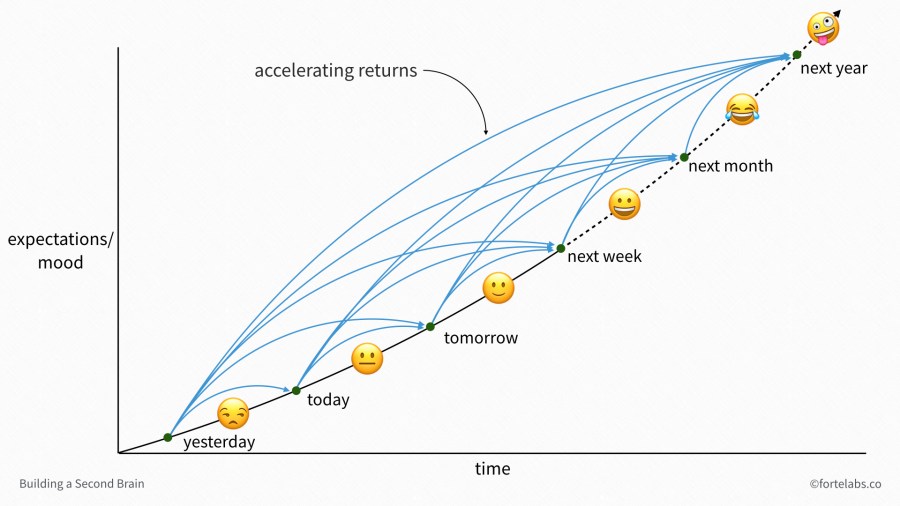
In Part 18, I introduced the idea that our states of mind come and go in “waves of motivation,” and that we should try to use them to our advantage, instead of forcing our mind to conform to our will.
A “motivational state” is more colloquially known as a “mood.” Moods usually have a negative connotation when it comes to productivity. Feeling “moody” is generally not considered a desirable thing while working. Often we don’t feel “in the mood” to do something we know we have to do, and we find ourselves at war with our emotions. That isn’t exactly the best environment for creativity.
But what is the function of moods in humans? What role do they play in helping us adapt and survive?
An intriguing answer is suggested by this paper: that the function of moods is to create momentum in the mind.
In nature, sources of reward are correlated: if you find three juicy fruits in a short period of time, that is probably not random. It probably means it is spring, and you are in a grove of fruit trees, and it’s rained recently, and there are a lot of other fruits around, and most importantly…you should get your butt in gear and collect as much fruit as you can before it’s gone!
In other words, moods drive us to act opportunistically – to do more of what’s already working. Our brain extrapolates that what has just happened will keep happening, forms expectations of the rewards it will encounter, generating anticipation, which is the key motivator of action.
This is the source of the advice to “fake it till you make it,” which absolutely works. We can essentially trick ourselves into a certain mood by creating a series of small wins, which put us “in the mood” to pursue even more, which generates more wins, which further puts us in the mood. By taking some action, however superficial or insecure, you “prime the pump” of your emotions in a certain direction. Action primes emotion, and then emotion primes further action, in a feedback loop.
In this view, motivation is not a fixed character trait. It is a fluctuating psychological resource, which is in line with the latest research on “psychological capital.”
Positive psychologist Mihaly Csikszentmihalyi, who also first described states of flow, noted that psychological capital “is developed through a pattern of investment of psychic resources that results in obtaining experiential rewards from the present moment while also increasing the likelihood of future benefit.”
In other words, we can generate momentum by:
- Structuring our work to produce value now
- And also produce value in the future
Why is this so powerful? Because you quickly start to benefit both from the information you’re consuming now, and the information you’ve consumed in the past:
The brain detects the beginnings of this exponential curve, and extrapolates it forward, giving you anticipation, desire, excitement, and motivation – the crown jewels of creative productivity. In effect, the brain imagines a future based on the present, which then becomes a self-fulfilling prophecy.
Now consider the typical project. Whether you work in a large organization or completely solo, the pace of progress is nowhere near fast enough to produce a sense of accelerating momentum. Working in big chunks that span weeks or months, the project seems to drag on forever. No wonder so many projects are so painful – our brain is extrapolating that the future is likely to hold more of the same, which is tremendously demotivating.
This isn’t just a matter of “employee morale.” With creative work, finding sources of motivation is always the most basic challenge. You simply can’t produce your best work without a clear sense of why it’s important to do it well.
But to fake momentum until we discover that why, we need payoffs on the scale of minutes, not hours or days. This is the real reason Progressive Summarization, my method for capturing and summarizing notes, is so valuable: because each “layer” of summarization is exponentially faster than the previous one, even summarizing a single article produces accelerating rewards and motivation. Once we can do this at the level of tasks, it becomes much easier to do it at the level of projects, which we’ll examine next.
Explosive inspiration
One of my favorite quotes is from Josh Waitzkin in his book The Art of Learning:
“In performance training, first we learn to flow with whatever comes. Then we learn to use whatever comes to our advantage. Finally, we learn to be completely self-sufficient and create our own earthquakes, so our mental process feeds itself explosive inspirations without the need for outside stimulus.”
In this single quote, Waitzkin has laid out a complete roadmap to peak performance.
First, we learn to “flow with whatever comes.” We learn to survive whatever life throws our way, trying our best to make the best of good times and limit the damage in hard times.
If and when we move beyond that, we learn to “use whatever comes to our advantage.” This is the approach I’ve outlined in the previous part – opportunistically taking advantage of whichever state of mind we find ourselves in, by choosing an activity that naturally suits it.
But there is a third level of performance, that I think few people ever reach: to “be completely self-sufficient and create our own earthquakes.”
I’ve only caught glimpses of this in myself and others, but what it looks like is that you no longer wait for the waves of motivation to arrive. You use everything around you as a source of creativity, but do not depend on any particular source. You know that you are the source of creativity. You can generate whichever mood you need for the task at hand.
You might be tempted to take away from this article that it’s all about taking action. But it’s not quite that simple. If you don’t have access to your emotions, you won’t have anything to prime. If action is the engine, emotions are the fuel that keeps the chain reaction going.
The key to this third level of performance is personal growth and self-awareness. It is the control on the other side of surrender. It requires opening up the flow of emotions within you, letting go of everything that causes you to contract, so the endless source of energy obscured under your fears and doubts has a chance to emerge.
Follow us for updates on Twitter, Facebook, Instagram, LinkedIn, or YouTube.
The Only Subscription
You Need to
Stay at the
Edge of AI
The essential toolkit for those shaping the future
"This might be the best value you
can get from an AI subscription."
- Jay S.
Join 100,000+ leaders, builders, and innovators

Email address
Already have an account? Sign in
What is included in a subscription?
Daily insights from AI pioneers + early access to powerful AI tools









Comments
Don't have an account? Sign up!